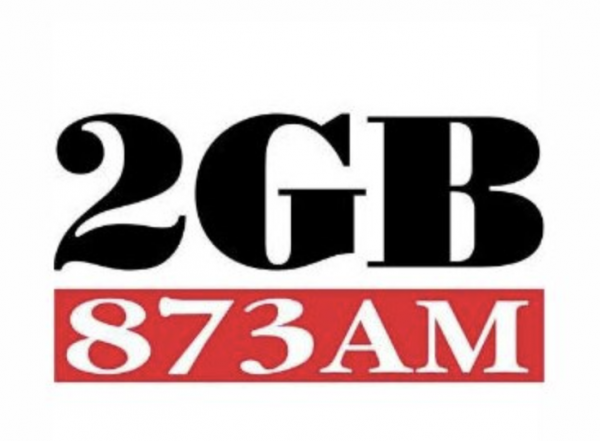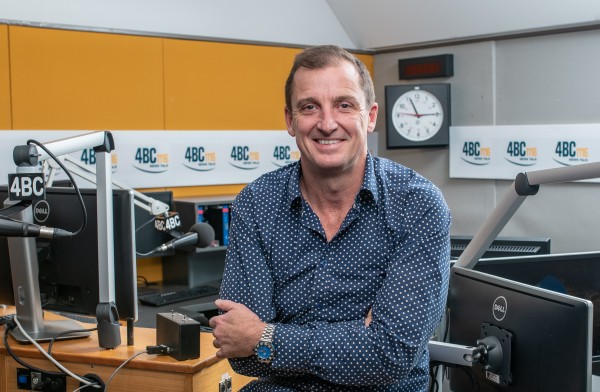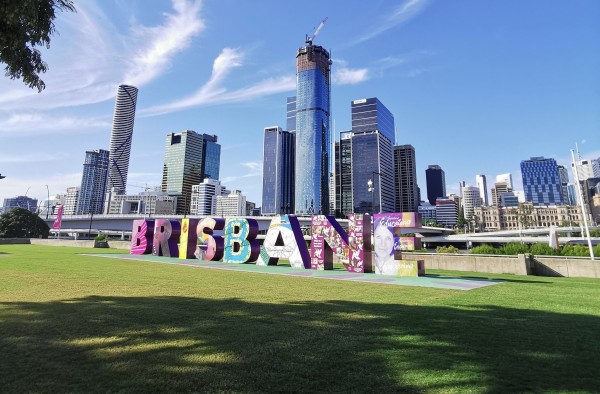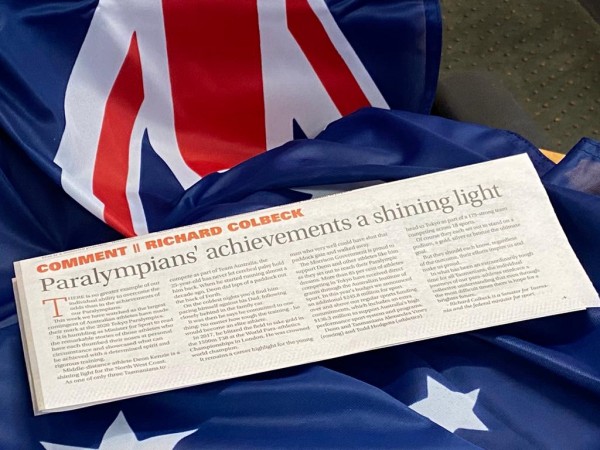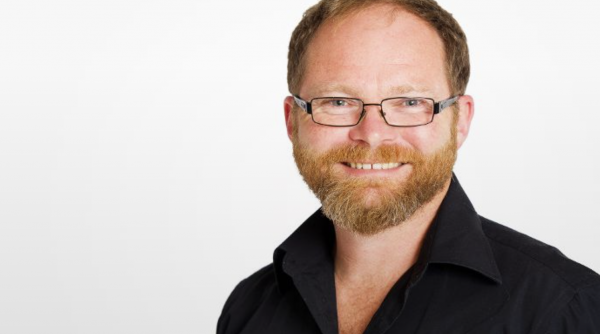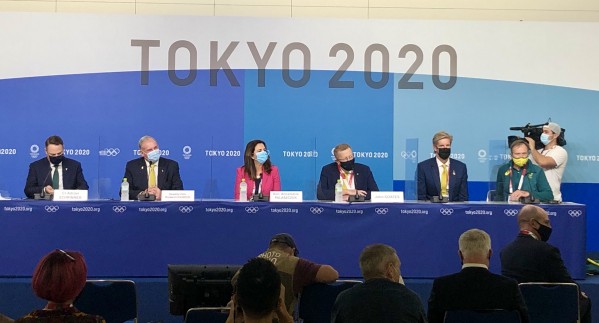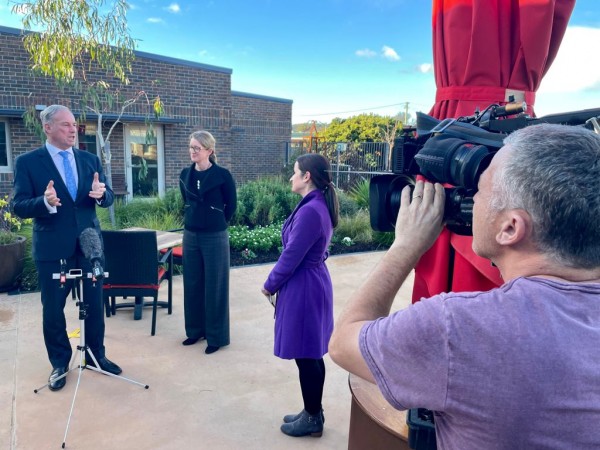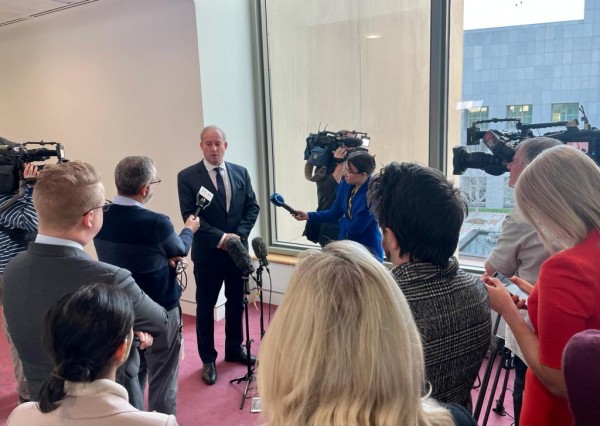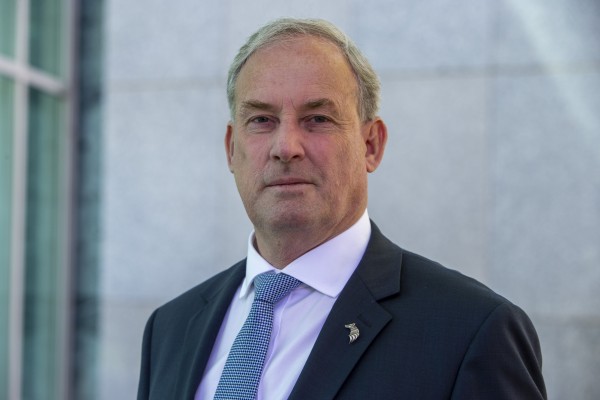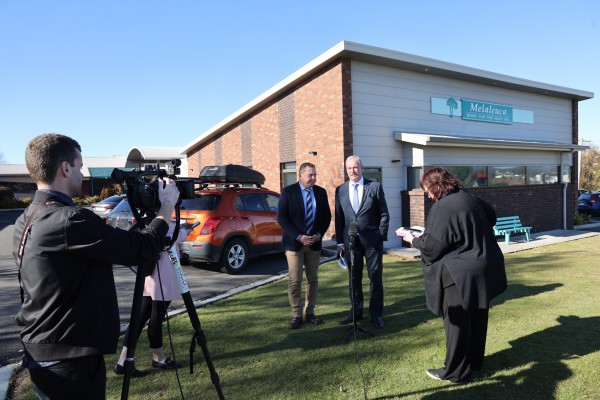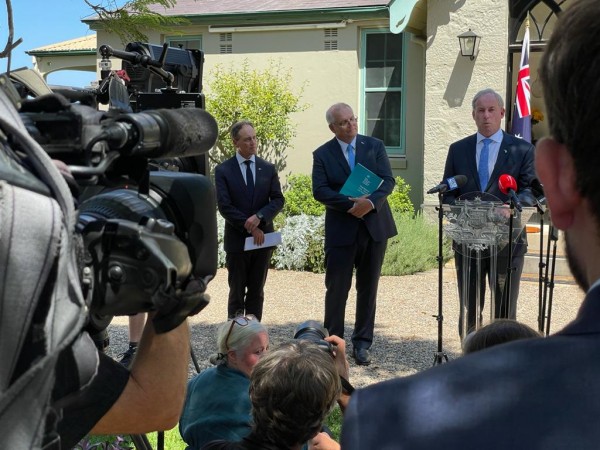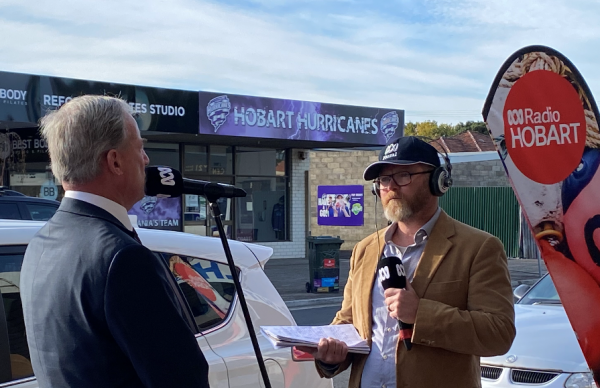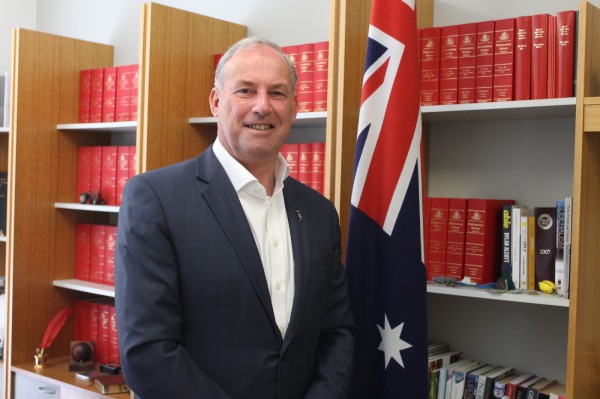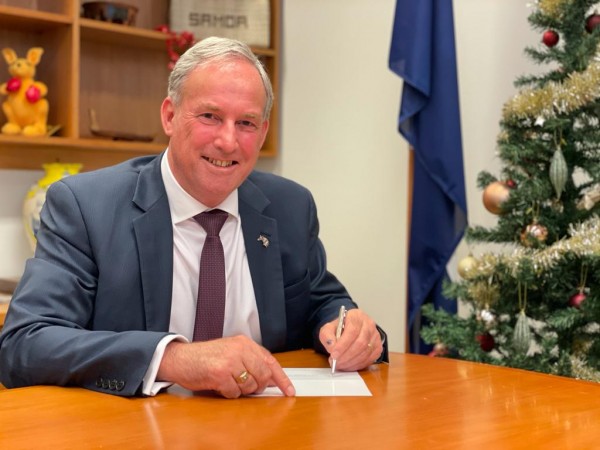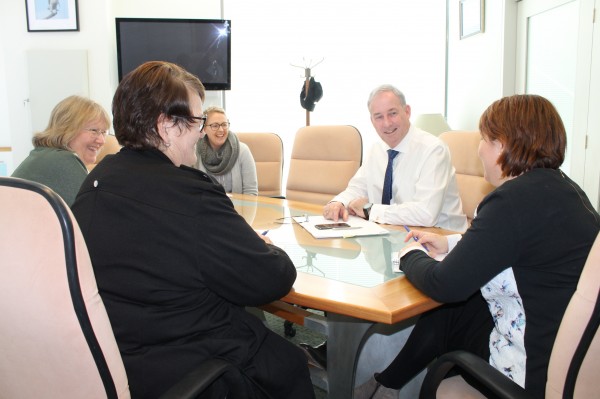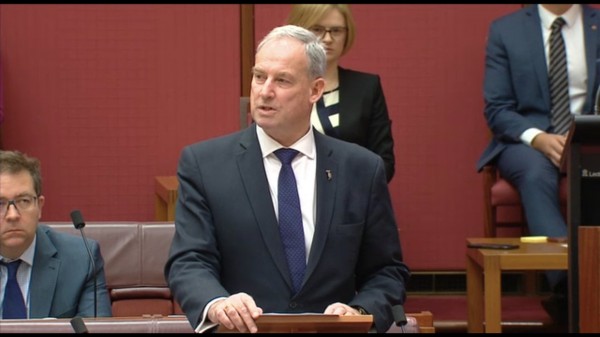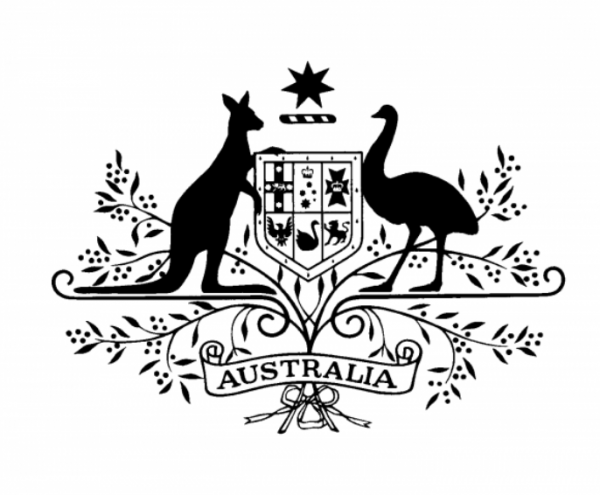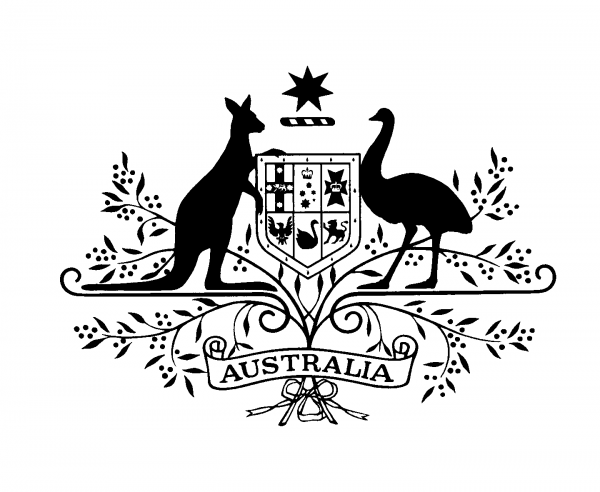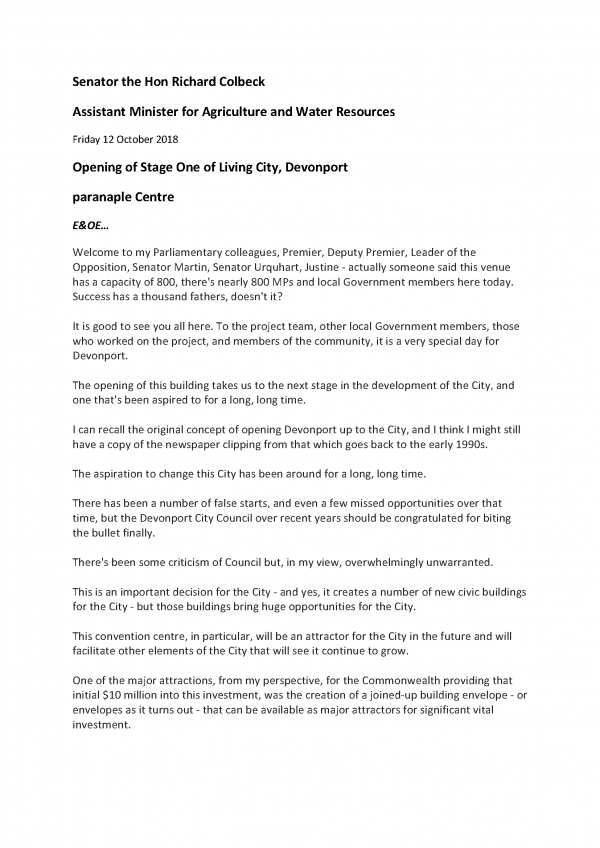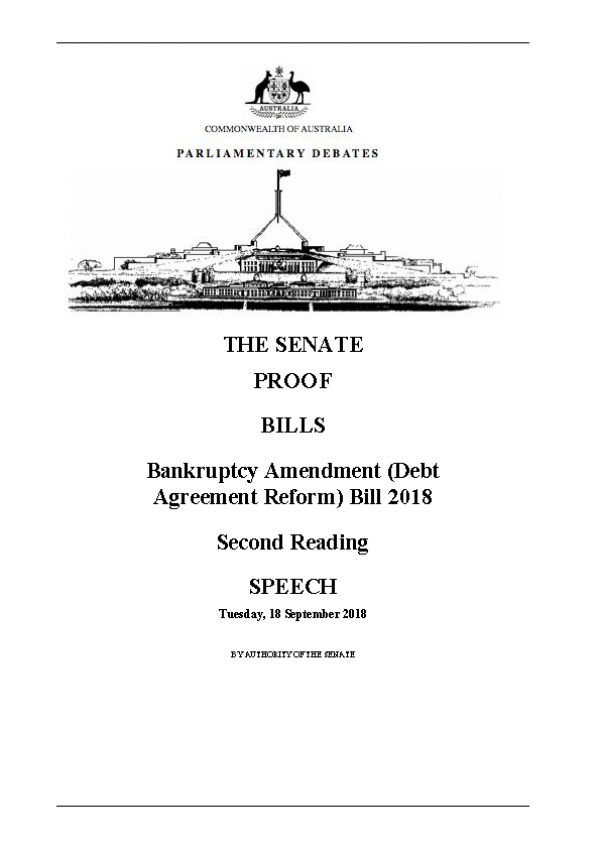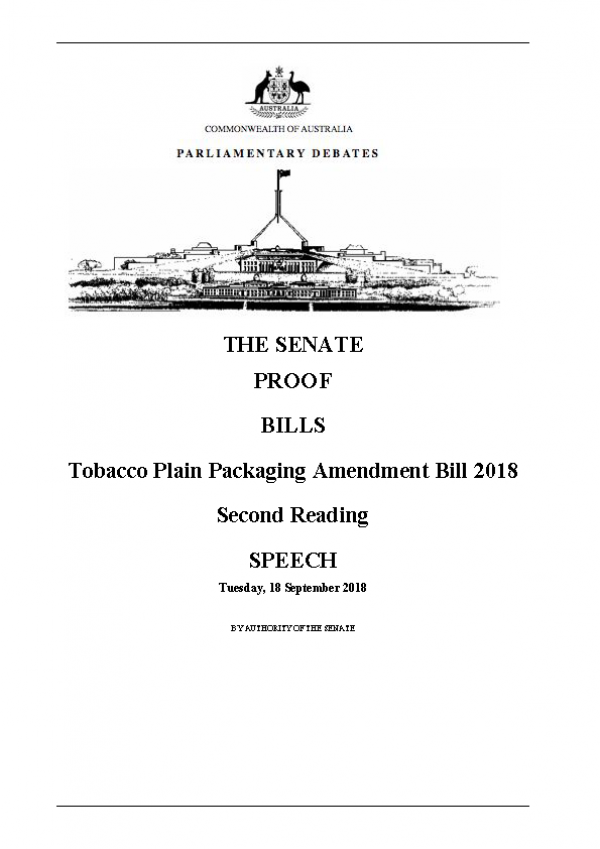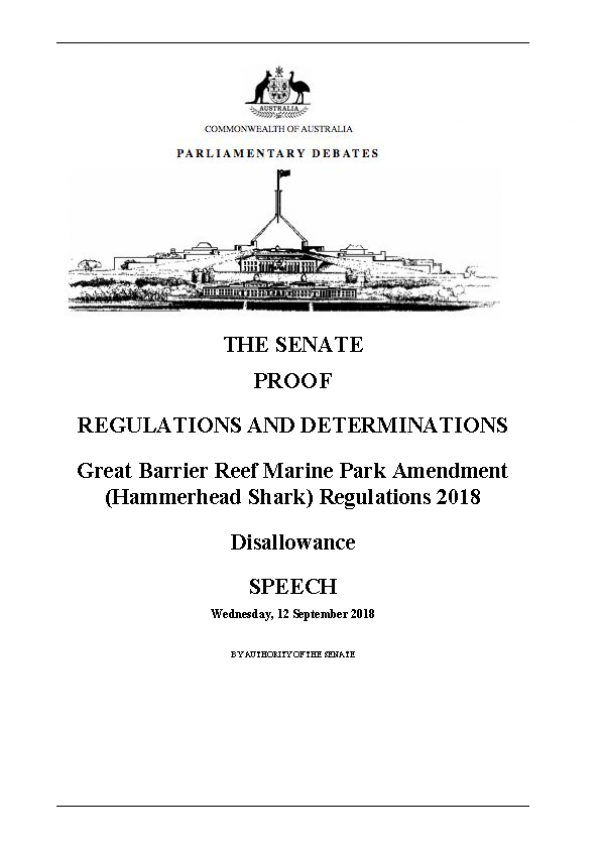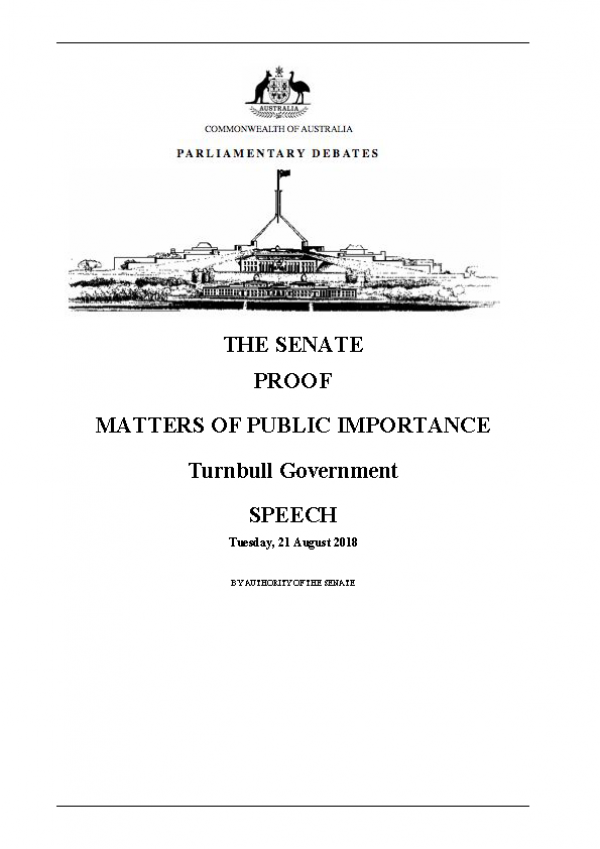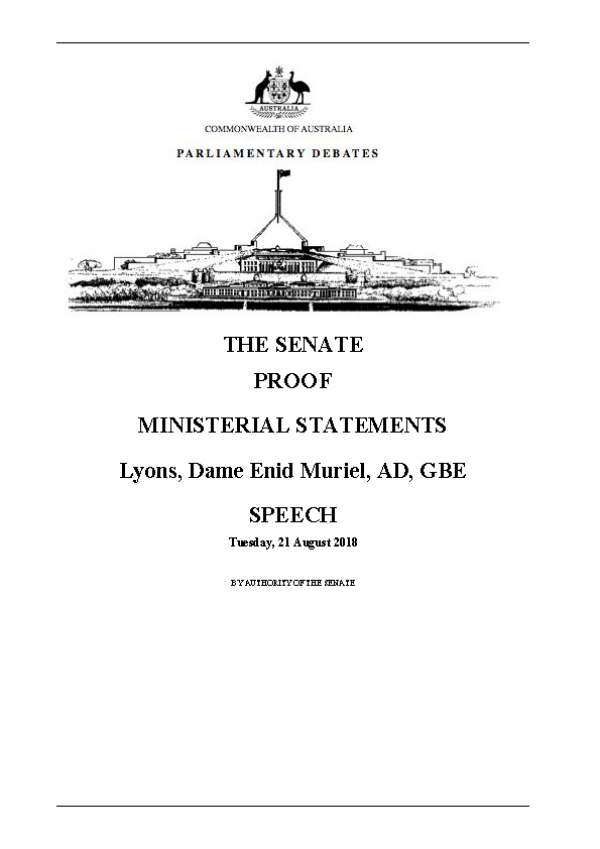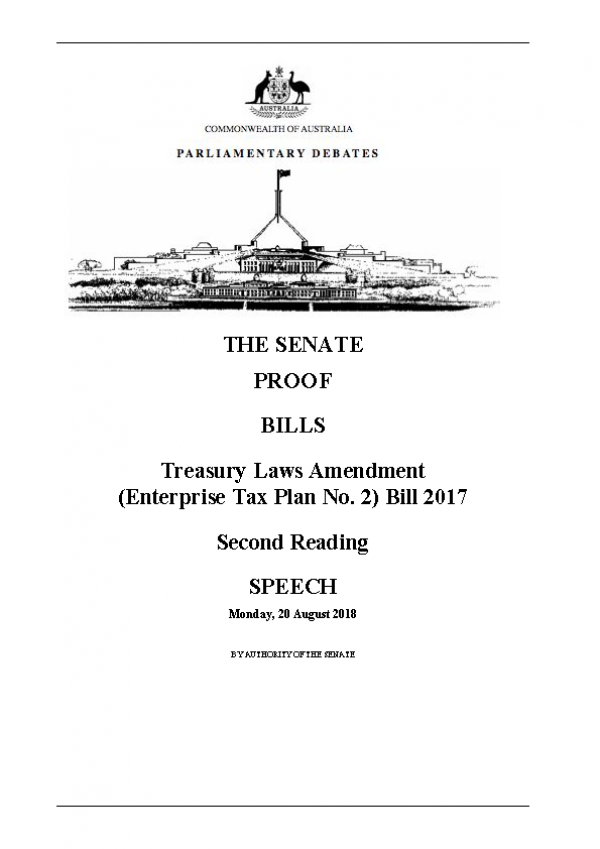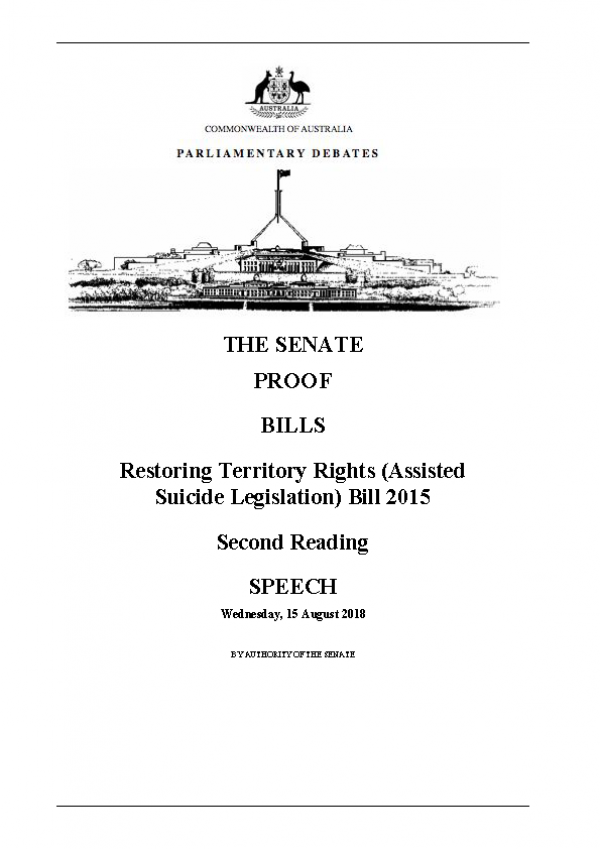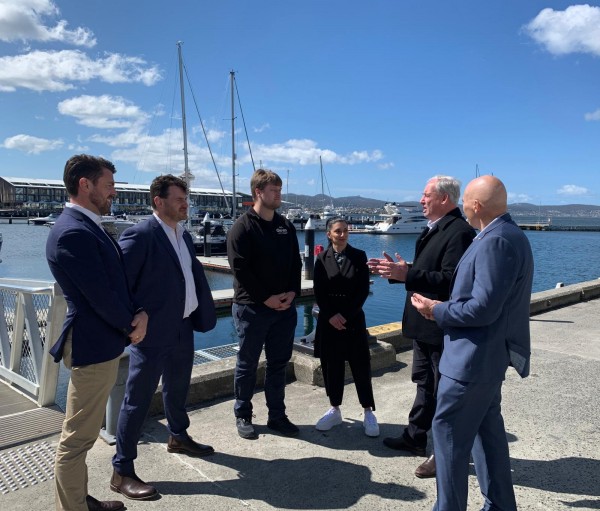
Transcript: Joint Doorstop with Senator Richard Colbeck, Shadow Minister for the Environment, Fisheries and Forestry Senator Jonno Duniam, Salmon Tasmania CEO Luke Martin and Tasmanian Chamber of Commerce and Industry CEO Michael Bailey, Hobart, 1 October 2024
Senator Colbeck:
Well, it’s great to be here with my colleague, Senator Jonno Duniam and our candidates for Franklin and Clark, and representatives of industry in Tasmania to talk about a private senators' bill that I’ll be introducing into Parliament next week.
When the Australian Government, through Minister Plibersek, decided to reopen an 11-year-old approval under the EPBC Act, it created a precedent and a level of uncertainty for anyone who had received an approval under the EPBC Act in the past. Now, we know the impact it’s had on the salmon industry here in Tasmania, but if anyone believes that the environmental movement won’t use that precedent in other industries and sectors, they’re kidding themselves. Because they will.
We think that’s a reasonable change to the EPBC Act. It provides certainty to industry, to investors, to communities, to people working in those affected industries, and it provides a good way for us all to move forward. So, a simple change to the EPBC Act; one that everyone should be able to get behind because it doesn’t cut anybody out. But it provides, importantly, certainty for industry, for communities and for people working in those businesses. And particularly for those who have made significant investments into first applying for an environmental approval, getting that approval passed, and then wanting to invest in a major project that requires approval under the EPBC Act.
Journalist
So, there’s still an avenue to review after the three years, it’s just limited to state and territory ministers?
Senator Colbeck:
That’s correct. There is still capacity for review of a decision but the capacity to request that review is limited to an appropriate minister within the state or territory where the approval has been given.
Journalist:
Why three years?
Senator Colbeck:
Well, I think that’s a reasonable time; we don’t want to lock people out of the system completely. We want the opportunity for people, for the community to be able to have their say and obviously they can do that during the period of the approval. It may be that the Parliament decides that it wants to change that, shorten it for example. My private senators’ bill puts three years on the table as a part of the process and obviously after three years it’s only the state minister. I think that’s an appropriate period of time, we can’t be accused of locking people out, locking the community out but it gives some certainty and some surety to industry – who are the ones, after all, who are investing their money into these really important projects, programs, industries that support our local communities, particularly in regional Australia. And so they have some surety going ahead that they’re not going to be knocked over on the whim of a letter from the Bob Brown Foundation, for example, which is what we’ve seen with Macquarie Harbour. Minister Plibersek didn’t need to make the decision to reopen this approval, as she claims. She could have said “No, I’m happy with the existing approval, we’ll continue to work with the state under the systems that they have…”.
This put some parameters and some time frames around it, and after that – the process changes.
Journalist:
So, it goes back to state and territory ministers for review after that three-year period, and then do they choose to put it back? Does it start the three years again if they say “Yes, we do think this needs to go back to a review”, or is it up to them to make the final decision, and is it trying to take the powers away from the federal minister and EPBC Act?
Senator Colbeck:
No, the powers stay with the federal minister. The point is that the only people who can request a review will be the appropriate state or territory minister within the state or territory where the approval has been granted. For example, in Tasmania, it could have been the Minister for Parks and Environment requesting the federal minister to review a decision that had previously been made; that is the restriction that’s being put in place as part of this piece of legislation.
Journalist:
What’s your chances of getting this through the federal Parliament, Richard?
Senator Colbeck:
Well, look, we’ll start now talking to members of the crossbench. I think this is a very reasonable piece of legislation, as I said it’s not designed to lock people out; it’s designed to give people the opportunity to have their say but to put some parameters around that process to give industry some certainty. I think that’s fair; I think that’s reasonable. Obviously, I’ll be working with industry across the country because this affects a lot of industries, here in Tasmania our aquaculture industry, our forestry industry, some parts of agriculture. But, also, particularly mining critical minerals – all of those sorts of things - and to be frank, even wind farms and solar farms require EPBC Act approval. Certainty for all of that investment I think is really important, this put parameters around the process to open an existing approval up for review. That’s all it does. It’s not changing the rest of the system or process; it’s putting some parameters around the process for review of an existing decision.
Journalist:
If this doesn’t pass in this term of Parliament, will you take it to the federal election?
Senator Colbeck:
Well, I’m sure Jonno will have some things to say about that. I’m hoping that we do, in fact I’m sure that we will. We’ve said that we want to make sure that there’s some surety. As a party, we want to make sure there’s surety for organisations who are seeking and gaining approval under the EPBC Act. We’ve been very strong, I think, with our words in relation, particularly in support of the salmon industry and the mining industry here in Tasmania. It’s absurd that we sit at a situation right now where on the West Coast and North-West Coast of Tasmania you’ve got the salmon industry with uncertainty; you’ve got MMG at Rosebery with uncertainty, and you’ve got a wind farm on Robin’s Island with uncertainty, with respect to the EPBC Act. We think that’s absurd. We want more certainty around the approvals process, and we’ve been very, very strong on that; and this is a process to provide some certainty to industry once an approval has been received.
Journalist:
Do you think this legislation is enough of a threat to Tanya Plibersek to get her to rush along on her decision-making around these things like salmon farming on the West Coast?
Senator Colbeck:
This is not designed to be a threat to anybody. This is designed to put some parameters around the existing provisions in the bill so that industry, communities, people working in those industries can have some certainty that once an approval has been granted, it won’t be overturned or reopened on the whim as we’ve seen with salmon farming on the West Coast of Tasmania, to extraordinary costs. And I’m sure Luke can talk about that to you later.
Journalist:
Is this a [inaudible] on federal Labor ahead of the federal election?
Senator Colbeck:
No, it’s actually a simple piece of legislation [inaudible] issue that came to my mind. I’ve spoken to my former environment ministers [inaudible] they are aware of this issue, they’ve discussed it as a group of environment ministers at the state level, post Minister Plibersek making this decision. Minister Plibersek’s decision created a precedent. This piece of legislation is simply to look into it, to see how we deal with that precedent. Should environmental approvals open-ended and at the whim of an environmental group? I don’t think they should.
Journalist:
So it’s not about making it easier for Mal Hingston to get elected?
Senator Colbeck:
This is a very practical piece of legislation that puts some parameters around the opening of an approval previously granted under the EPBC Act. It’s that simple. Now, would I be happy if the Labor party said it supported it? Absolutely I would. I’d be delighted if the crossbench would support it. I think it’s a very, very sensible solution to a precedent that’s been created by the current Environment Minister. It’s that simple. It’s about providing a solution to a problem that has occurred, we’re putting a potential solution on the table. I hope that my colleagues in the Parliament decide to support it.
Journalist:
Does it appear to you that state and federal Labor are split on this issue?
Senator Colbeck:
Well, they’ve got a serious problem. State Labor say they support salmon farming but if you look at the actions of the federal Parliamentary party, where this industry – that’s worth over $1 billion to the Tasmanian economy – still has uncertainty; is still being required to make submissions to a process that was opened up by a decision of Minister Plibersek. It’s absolutely absurd and I can understand the Tasmanian community being completely confused about where Labor actually sits on salmon farming. Because you’ve got the federal government through the Minister for Environment doing one thing, you’ve got the state parliamentary party saying something else, so what is the real answer to that question? I can understand the communities of Tasmania being completely confused about where Labor stands on really important issues of natural resource use. Because they’re looking to protect their own seats from Green attack in inner-city Sydney and Melbourne, and that’s exactly what Minister Plibersek is doing, rather than supporting our regional communities, where there are vital jobs where these business and industries form such an important part of the local community. I mean, got to Strahan, and two-thirds or three-quarters of the kids at Strahan Primary School are from families who work in the salmon industry. That’s how important this industry is. Take those students out, and the viability of that community comes into question. It’s an absurd proposition. From an industry where the workers value their environment, they work hard to do the right thing every day to look after it. It’s an industry that’s investing its own funds into the survival of the Maugean skate, in the oxygenation of Macquarie Harbour, in the actual and practical solutions. And yet, you’ve got Labor ministers protecting themselves from Greens attack in Sydney and Melbourne, at the expense of our communities in Tasmania, and I think that’s outrageous. And that’s why I think it’s very, very easy to understand why Tasmanians are so confused about where Labor really stands on this.
Journalist:
Senator Duniam, do you want to explain how this doesn’t undermine environmental protections?
Senator Duniam:
Well, it doesn't undermine environmental protections, because the law of the land under the EPBC Act still applies for as it is today for 3 years, and then after that, a minister of a state or territory government will be able to request an initiation of a review. Now, I expect under this scenario, with these laws, the Bob Brown Foundation and the taxpayer-funded Environmental Defenders Office could lobby a state minister to request a review, that is still open to them. But to have this open-ended loophole, that is being exploited by Green anti-jobs activists, is not what we need in this country. They’ve found a new loophole and they’re going to exploit it. We need certainty now for investors, because investors bring jobs. People need jobs to pay their mortgages and power bills; the people of Strahan and anyone working in the salmon industry today are looking at what Minister Plibersek is doing and wondering whether they’ll have a job at Christmas, or after the next election, or which other industry is going to be impacted; is it mining? Is it forestry? Is it land development; the people we’ve tasked to help deal with our housing crisis? This bill is sensible legislation. The Coalition supports it. The test is going to be for Labor, this is an opportunity for them to put their money where their mouth is. They all turn up in the Australian Senate, and they tell us they support the salmon industry, and they’re fighting the good fight. Well, if you want to do the right thing by the salmon industry, or any other primary industry, support this legislation. With us, they have the numbers to pass through the Parliament next week, if they chose to do so. So, the onus is on them; are they for this industry? Are they for these jobs? Are they for the community of Strahan or are they against it?
Journalist:
Is this Coalition policy now? Do you take it to the federal election?
Senator Duniam:
It’s Coalition policy, we’re advancing this bill. There will be more to say on our broader reforms for the Environment Protection and Biodiversity Conservation Act, the EPBC Act. Tanya Plibersek promised that we’d have new laws in the Parliament by the end of 2023. We have none to replace the EPBC Act. We’ve got new laws for a new green bureaucracy, but it is the same old broken laws we had before us. For two and a half years she has sat on her hands and done nothing. That is why Richard Colbeck, with the support of the Coalition, is bringing forward legislation to try and close these loopholes being exploited by activists. We are standing up for those people who want their jobs to be safe, when this Labor government is doing nothing.
Journalist:
If Tanya Plibersek came out tomorrow with her findings on and answer to her review of the EPBC Act and gave some surety to those salmon farming workers, would Senator Colbeck withdraw?
Senator Duniam:
Well, no, we should not be in this situation. This uncertainty that has been lingering over this industry for a year now should never have been allowed to happen. A government that says it’s a friend of the worker and wants to see a future made in Australia should back industries that actually create jobs and productivity in this country. My hunch is, there will not be a decision before an election, she will leave that uncertainty hanging out there, she should support the bill. The Labor party, the friend of the worker, should support workers by supporting this legislation. As I say, they’ve got an opportunity to back in what they say in parliament by supporting this legislation and preventing this from happening again into the future.
Journalist:
The federal government likes to say that this EPBC Act kerfuffle, I suppose, is due to John Howard bringing it in, did he get it wrong at the time?
Senator Duniam:
No. The laws are more than twenty years old, they’re I think twenty-five years old now, and the laws were fit for purpose at the time, they’ve been amended umpteen times, and we now have an unworkable situation, we’ve got green activists who are finding loopholes to exploit every day. They’ve moved from the forestry crew, from the salmon pens, from the mining leases, into the courtrooms, and they are finding ways to exploit this legislation, to jeopardise job creating, economy driving projects like the ones we’re talking about today. So that’s why it’s important that these laws are passed, to provide certainty to the people of Strahan, to the people in regional communities right across Australia and to people who want to invest their money in creating jobs in Australia.
Journalist:
So, for you, it’s more about the jobs as opposed to shutting down [inaudible].
Senator Duniam:
Well, green activists have one thing in mind, they say it’s about protecting the environment but in their mind, they can only protect the environment while there is no industry occurring. I totally reject that view. That is not an accurate view of the world. Good environmental outcomes are not mutually exclusive from good economic outcomes, and on that basis, we think this legislation protects jobs, provides for good environmental outcomes and the green activists need to get back to basics, and if they want to go and protect the environment they can find good projects to support, like riparian zone revegetation, protecting wildlife and endangered species out there in the field, not in the courtrooms with spurious challenges like the ones we’ve seen here.
Journalist:
Is this a sign that you’re going to try and wedge federal Labor on salmon and the environment during the election campaign, that that’s going to be one of your key election issues?
Senator Duniam:
Well unfortunately the Australian Labor Party, the friend of the worker, have wedged themselves on this one. You’ve got every Labor Senator from Tasmania standing up in the Senate saying they support this industry, but doing nothing about it. It’s been twelve months since this process started and every single person dependent on that industry for an income, particularly in Strahan, is still waiting for a decision. They don’t know if their jobs are secure. And so this is not about wedge politics. If Labor are genuine in what they say, they’ll support the bill this week and the issue will go away. Tanya Plibersek could be lobbied to make a decision tomorrow, and her colleagues in Tasmania, Anne Urquhart, Carol Brown, Brian Mitchell, Julie Collins, the Minister for Fisheries I might add, should be demanding a decision be made now, so that we end this uncertainty. This is not about wedge politics, we’re doing what Labor won’t do, and that is creating certainty where uncertainty exists and we have these massive question marks hanging over job creating industries in this state.
Journalist:
Would your party rule out doing any kinds of deals to secure support for this legislation?
Senator Duniam:
Well it’s up to every other party in the Senate as to what they do. As I say, the Coalition’s right behind it, if the Labor party decided that they actually wanted to put their money where their mouth is and back in salmon workers and mine workers and foresters, they could vote for this legislation as well. As Senator Colbeck has said, we are open to amendments, it’s not about cutting deals it’s about doing the right thing for the people we represent. Labor came to office saying they’d fix everyone’s problems, they’d grow the economy, they’d bring down the cost of living, they’ve done none of that. They’ve got an opportunity here through the leadership the Coalition and Senator Colbeck have shown. They can follow our lead and support this legislation, and these issues will start to go away.
Luke Martin:
Well, firstly, it’s rare when you actually find commonality of agreement across all sides of politics, but also in areas of debate around issues around resource investment that happen. But I can tell you there is one, everyone agrees that Australia’s environmental laws are amiss. The EPBC Act is well past due for renewal, and that’s something that Tanya Plibersek committed to do. She’s now kicked the can down the curb on that, pushed into, I guess, the next term of government, and no line of sight on when that will be addressed. And as I say, both sides of politics agree on that, I find, the conservation movement agrees on that, and certainly most sides of industry agree that current laws are failing on a number of levels and clearly, the situation we are going through is one of them. It is an extraordinary thing that you could be heading towards another Christmas, the end of another school year on the West Coast, with families who don’t know whether they will be sending the kids to school at Strahan Primary in February 2025 because of a process that was initiated not through regulators, not through scientists, but through legal letters drafted by lawyers for the Bob Brown Foundation and the Australia Institute. That’s what commenced the process over nearly twelve months ago and has created enormous uncertainty and division right across the community. I think everyone ultimately agrees that there are ways you manage the environment in practical terms but you don’t have a situation where you can have a complex, expensive, time-consuming process initiated through activists effectively gaining a loophole in the laws. What we really welcome is rather than kick the can down the road on reviewing and reforming the EPBC Act, Senator Colbeck and the Coalition are taking the initiative to actually try and address one of those loopholes now. Whether it makes a difference for the process we’re going through, I don’t know, whether it could be applied retrospectively if it went through I’m not sure, but we certainly see that this is absolutely creating a playbook for the activists to apply to potentially other sites than our industry. There are other EPBC decisions that are hanging over our industry and for sites that operate right across south-east Tasmania, but also clearly for other industries across the state and I think one of the things that has dawned on a lot of other industries across Tasmania is that you can go through a really challenging process, the EPBC process can take years to get approvals, and no-one envisages that twelve years later that approval can be re-opened, effectively, not through science, not through regulation but through some carefully crafted letters from lawyers. Clearly that is beyond most people’s expectations of how the system should work.
Journalist:
You don’t think other industries should face that same uncertainty that the salmon industry has?
Luke Martin:
I think most people would understand that you don’t have a situation where a council re-opens the approvals on your house ten years after you’ve moved into it. When you’re making substantial investments as an industry, creating jobs, when you’re making long-term decisions, plans, you do it on a basis of certainty. And clearly, the process we’re going through completely represents sovereign risk right across the system and that can be applied across the renewable energy sector, obviously the mining industry, forestry industry, and if I wore my old hat, certainly nature tourism projects across the World Heritage areas. Everyone understands that you need a process for reviewing decisions when new information becomes available, in the case of the Maugean skate, absolutely, you need to look at the science and the research that’s made available, and you need to work through the system to make sure that you’re applying conditions and applying standards that ensure that those conservation risks are managed, but you don’t do it through a contested legal process initiated through third-party activist groups. We know particularly the BBF and the Environmental Defenders Office, they have a lot of resources, they have a lot of money, they have a lot of well-funded lawyers, they have got the absolute resource to keep applying this time and time again against industries right across the Tasmanian economy and indeed right across the country.
Journalist:
We’ve seen people get into near physical altercations debating this issue at the pub on the weekends, is there an element of bringing in this legislation so close to a federal election, do you think that could further stoke division and potentially be dangerous?
Luke Martin:
I frankly don’t give a stuff about the federal election, what I care about is the kids on the West Coast being able to go to school in their town next March. I think it’s very easy for political commentators to talk about election speculation. What we’re trying to do is go through a process to provide certainty for our workers and communities, and again, minimise division. And frankly when you have a drawn-out, twelve-month long process, where you get well-resourced positions on both sides of the debate, you create division. And you can’t have industries in Tasmania that continue to go through the cycle of debate with the premise of federal election politics playing over it. It is really challenging to see what’s going on on this issue, it’s a small community on the West Coast, and people obviously care deeply about the environment they care deeply about the community that they’re a part of, and obviously a lot of Tasmanians care deeply about conservation of our native species, we’re all in common agreement about what we want to achieve here. But I think what we’re ultimately also seeing is a debate about science that’s not constructive and a really confusing, frustrating and drawn-out process that’s just been allowed to run its course to a limitless time and again, I really hope the federal election isn’t a factor. Unfortunately, a realist understanding is that that probably is what’s going to happen, but certainly from our perspective what we’re holding onto is the science, in the last three weeks we’ve seen IMAS, who are the researchers doing the work on the Harbour, come out and say that the population numbers of the Maugean skate have stabilised, that didn’t come as a surprise for us, we’ve known and expected that to be the case. We’ve also seen the EPA come out showing the conditions in the Harbour are the best for over a decade, proving the adaptive management that they’ve adopted, reducing the loadings in the Harbour are working, it supports what we’ve been saying all along. You do not take this enormous, confrontational step of removing the entire industry from the Harbour when there is science to prove that the adaptive management of that industry is actually achieving the results that we want, which is conditions in the Harbour that allow the skate to prosper, and recover, but also supports and underpins the regional development.
Journalist:
Just quickly Luke, have you got any update on when a decision is expected and when does it need to come?
Luke Martin:
No, look, our concern is Christmas, our concern is school years, frankly, because it’s a down tools decision. That’s the risk here, it could be a down tools decision. Again the EPBC process, for its enormous flaws, it also never envisaged a situation like this being able to be applied over the livestock industry. So, the conditions about how any decision would be applied, the legal ramifications of that, are all things that we are scenario planning for, but again our time frame, we would like this decision resolved quickly, we believe it can be resolved quickly, we think the science supports it being resolved but we also know full well you can guarantee that there are a whole set of employees sitting in those activist organisations ready to apply all sorts of legal injunctions to [inaudible]. It suits their agenda and ultimately they’re not going to be satisfied if any resolution doesn’t see the destruction of an industry.
Michael Bailey:
Firstly, I might start by saying congratulations to Senator Colbeck [inaudible] very important legislation. We will see where federal Labor’s heart lies, whether it lies with workers or whether it lies with chasing inner-city Syndey and Melbourne Greens seats. At the end of the day, we know that the environmental protest organisations have recognised environmental processes across Australia, we know that the EPBC process is a quagmire of delays, which is created by the lawyers of these organisations trying to delay, they don’t try and stop projects they try and delay them, long enough so the developers give up. We have at the moment about $20bn worth of projects sitting in this office in Canberra waiting for approvals, at a time when Tasmania struggles for energy, we’re in the middle of an energy crisis, we can’t get a wind farm up. At a time when we’re struggling for jobs and struggling for a future for families in Tasmania, we can’t get surety around projects and industries that are critical for our state, critical for the world. It is time for a change, it’s great to see this brought forward. This doesn’t take away the voice of local communities, what it does is just put a sensible time frame around these approvals. At the moment, the system’s broken and it needs to be fixed.
Journalist:
And you think that this will be beneficial not just for the salmon industry but for things like the renewable energy industry?
Michael Bailey:
At the moment we have several major wind developments, and also other clean energy developments, spinning their wheels slowly in Canberra, waiting for some sort of approval. This process seems never ending, it seems at every corner there is another appeal brought forward by another [inaudible] protest organisation designed to [inaudible]. This needs to stop, [inaudible] at least a time frame [inaudible]. We’ve always said, [inaudible] that should happen quickly. Developers shouldn’t have to wait decades for approvals. Look at the decades of delays that many of these projects have ben waiting for now, it’s absolutely crazy. Again we’re in the middle of an energy crisis, and we can’t get a wind farm up in Tasmania, it’s madness and it needs to change.
Journalist:
I just have one on the Coordinator-General, [inaudible] news about travel expenditure, does the Coordinator-General deliver enough bang for its buck?
Michael Bailey:
My interactions with the Coordinator-General have been very positive indeed, he has worked very hard for Tasmania, I’ll let others judge what will no doubt come out in the process but I’m not aware of those claims.
Journalist:
Do we get enough out of the Coordinator-General for $100,000 a year in international travel?
Michael Bailey:
I certainly believe we do. If you look at the projects that we’ve seen coming to Tasmania, like SunCable for example, those multi-billion dollar projects don’t happen without that sort of role, so my view is we need this role in Tasmania, [inaudible] what that role might mean, but fundamentally we need an easier way for developers to be able to come to our state and get projects moving.


